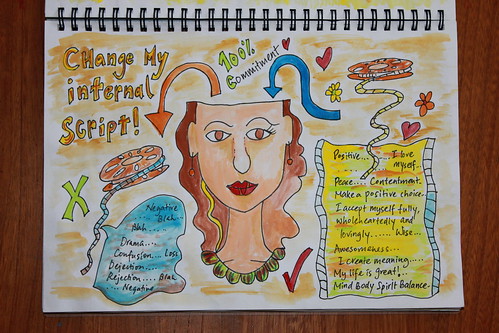How to Overcome 5 Negative Self Talk Patterns

As I have discovered, getting caught in a negative self talk pattern can be crippling. I found out how low my self-love was after becoming more aware of what I was saying to myself. It was shocking for me to realise that I was mostly in fear, shame and anger and how it had resulted in feelings of depression, exhaustion and depletion of energy.
 (From My Art journal: Self Talk Painting)
(From My Art journal: Self Talk Painting)
Fortunately, once I created the awareness, I had been able to change my self-talk to a more positive one.
You may decide to do the same exercise as I did too. Simply journal down what you say to yourself for a day. During this time, do not censor what you say or think. Simply write down your true thoughts and inner dialogue. After a day, go through what you have written for some reflection.
A word of advice, as you reflect. If you should come across anything negative that you’ve written, avoid criticising yourself for being harsh inwards. The last thing you want is to direct more negative energy inwards. The idea behind creating awareness is to bring about change, healing and transformation. It is not to punish yourself again!
What the 5 Negative Self-Talk Patterns Are
I went on to interviewing other people in order to find out what their self-talk was like. From the notes I collected, I discovered that there are at least 5 main negative self talk patterns. Would they be ones that you have too?
Negative Self Talk Pattern #1: Self-Criticism
I am way too stupid.
I am ugly!
I am such an idiot!
What was I thinking? I will never be accepted for who I am.
Self-criticism happens when we “attack” ourselves with harsh words. Self-criticism is synonymous with self judgment. We judge ourselves. In fact, we could be the judge and the accused?—?rolled into one.
With chronic self-criticism, we can have the debilitating tendency to put ourselves down. We become our own worst enemy. By being mean to ourselves, we invariably find it difficult to be more self-loving.
“Criticism, like rain, should be gentle enough to nourish a man’s growth without destroying his roots.” – Frank Howard Clark
Negative Self Talk Pattern #2: Self-Rejection
I am too fat.
I am too thin.
My boobs are too big.
My boobs are too small.
I have a horrible looking nose.
I am born unlucky.
I have no gifts.
Self-rejection happens when we are unable to accept ourselves fully and unconditionally. We reject the person we see in the mirror. And so we diminish our own value. We feel unworthy.
By devaluing the self, it is possible that we look up to others to make up for the qualities that we fall short in. However, it can cause us to give our power away. Our hero-worship of others masks the derogatory remarks that we say to ourselves.
An inner dialogue with words like the ones stated here can prompt a person with extreme self-rejection issues to suicide. Self-rejection can also lead to harmful illnesses such as anorexia or addictive behaviour such as drinking.
“Our entire life….consists ultimately in accepting ourselves as we are.” – Jean Anouilh
Negative Self Talk Pattern #3: Self-Doubt
I doubt that I can do it.
I am just too old to learn at my age.
I have always been a slow learner.
I am not intelligent enough.
I don’t trust that I can make my own decisions.
Self-doubt happens when we have little belief in the self. We lack trust in ourselves. When it comes to decision making, we would second guess ourselves.
Overcome with anxiety, we become paralysed into inaction. We may also doubt in our ability to receive resources, support and encouragement by others or the universe. Because of doubt, we lose much inner power.
“Our doubts are traitors and makes us lose the good we oft might win, by fearing to attempt.” – William Shakespeare
Negative Self Talk Pattern #4: Self-Pity
Poor me! I am ill fated.
Why does this always happen to me?
Why are others so much luckier than I am?
There is no way I can make it as I am born poor, stupid and ugly.
With self-pity, we make ourselves out as the victim. Like a mantra, we repeat our “poor me” stories. We justify that we are right by pointing blame outwards.
Self-pity invariably leads us to making comparisons with others. We believe that we can never measure up because we are never good enough. Wallowing in denial, defeat and grief, we feel a sense of helplessness.
Self-pity can rob the “victim” of joy. If we take a step back to reflect, we’d realise that no one likes being near someone with victim consciousness. Indulging in self-pity is toxic for the soul.
“Self-pity is our worst enemy and if we yield to it, we can never do anything wise in this world. ” – Helen Keller
Negative Self Talk Pattern #5: Self-Blame
It is all my fault for things turning out this way.
Why was I ever born? I never do things right.
Why am I such a lousy mother? I cannot even teach my children well.
I blame myself for causing the mistake or accident.
With self-blame, we believe that we are wholly responsible for whatever that has gone wrong. It does not matter even if there are factors beyond our control. Instead of pointing our fingers at others, we point them inwards.
Self-blame is like taking a ton of bricks and hurling them at ourselves. We feel crushed with all that weight on us. Caught in blame, it becomes difficult to perceive things with better perspective and greater clarity.
“Blame is just a lazy person’s way of making sense of chaos.” – Doug Coupland
How to Overcome Negative Self-Talk

Roman rhetorican and writer, Marcus Annaeus Senaca, said, “what you think about yourself is much more important than what others think of you”.
It is true.
If you think poorly about yourself, you’d constantly be feeling lousy. However, if you have positive and kind thoughts about yourself, you are likely to treat yourself with kindness and compassion. So even if others think poorly of you, you are still able to love and embrace yourself anyway. You are confident of who you are and you are less bothered by the opinions of others.
Indeed, the most important relationship in your life is with yourself. Since you are the one in charge of your thoughts and feelings, you can always change them to ones that support your well-being. Hence, choose words that are encouraging and that make you feel good about yourself.
Since working on transforming my own self-talk into a more positive one, I have felt a lot better. My life has improved tremendously and I have been able to assist others gain greater self-compassion and confidence too. I’ve also identified 10 self-talk patterns in all. If you like to work on creating more self-love and compassion, click over to purchase a copy of Self-Love Secrets – available as a download by now!
Love and Abundance always,




Evelyn Reply:
April 27th, 2011 at 9:01 pm
Hi Angela,
It’s great that you have enjoyed this post. What can I say? It goes to show that we are our own worst enemies. We would lend unfailing support to others but have few words of encouragement for ourselves. Sounds familiar?
I do the same too. I keep myself inspired as much as I can. Being in the flow helps keep the little voices of criticism away!
With love,
Evelyn
[Reply]